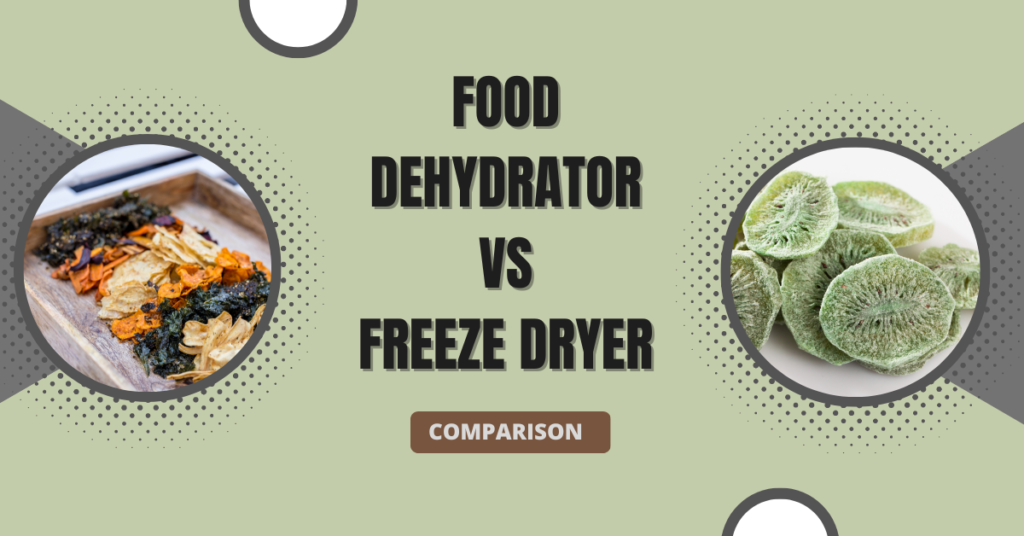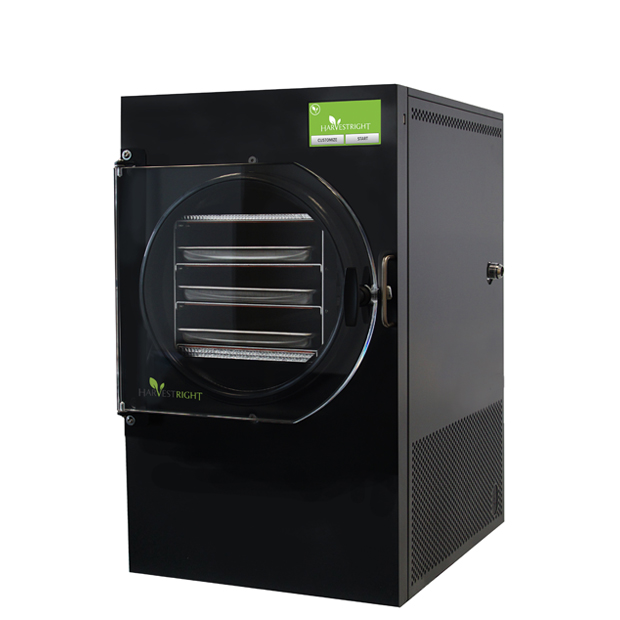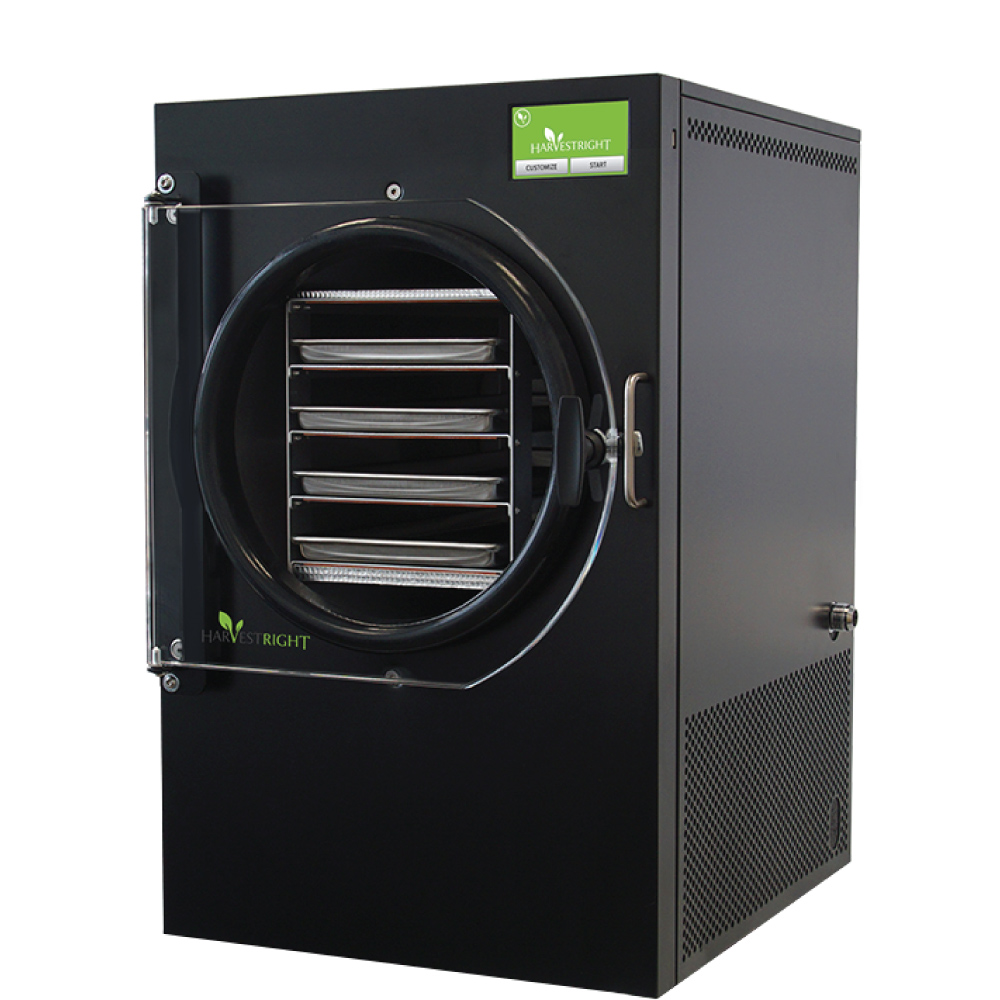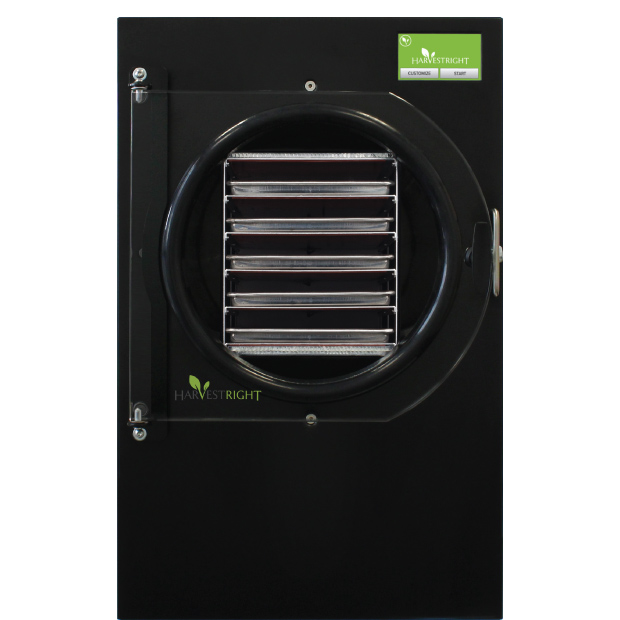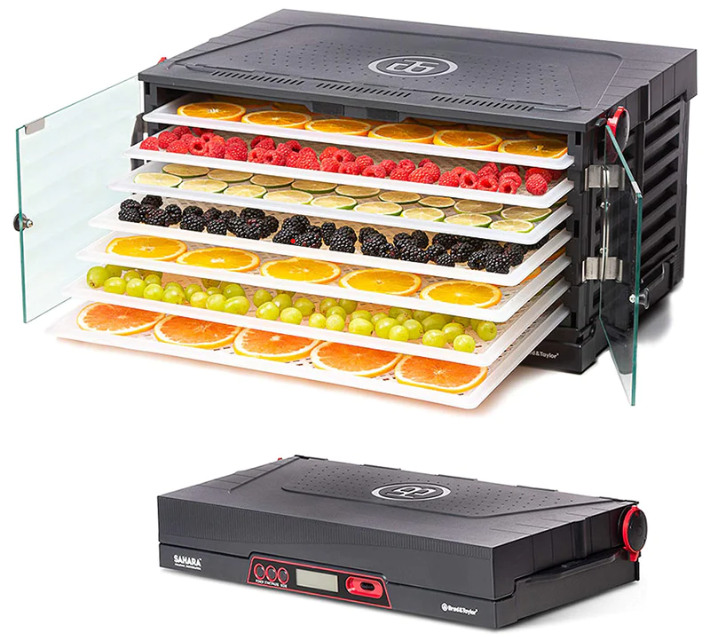In the world of food preservation, two popular methods stand out: food dehydrator vs freeze dryer. Both techniques offer unique benefits for extending shelf life and maintaining flavor, but which one is right for you? [1]
In this article, we’ll explore the differences between these two processes, understand their advantages and drawbacks, and help guide you toward making an informed decision based on cost, nutritional value, taste, rehydration time-frames, and much more.
Key Takeaways
- Food dehydrators and freeze-dryers are effective methods of food preservation, but they differ in technology, benefits, and costs.
- Freeze-drying generally creates a longer shelf life for foods compared to dehydration. It also retains more nutrients and has faster rehydration times. Dehydrating is more budget-friendly and can create versatile snacks.
- The choice between the two depends on individual needs, budgets, nutritional goals as well as personal taste preferences.
- Regardless of the chosen method, both options effectively preserve food while maintaining its health benefits and flavor.
Understanding Food Dehydrators And Freeze Dryers
A food dehydrator is a device that removes moisture from foods to extend their shelf life, while a freeze dryer uses extreme cold temperatures to preserve the texture and nutrients of the food.
What Is a Food Dehydrator?
A food dehydrator is a kitchen appliance designed to preserve various foods by removing their moisture content. This process not only prolongs the shelf life of the food but also prevents the growth of bacteria, yeast, and mold that thrive in moist environments.
These appliances typically consist of a heating element, an air circulation system, and multiple trays where you place your thinly sliced fruits, vegetables, herbs, or meats.
The even distribution of heat and airflow through these trays ensures consistent drying results across all portions of your produce.
How Does It Work?
Understanding the functionality of food dehydrators and freeze dryers is essential in determining which method best suits your preservation needs. Food dehydrators use low heat to gradually remove moisture from foods, slowing down bacterial growth and minimizing spoilage.
The process typically involves placing thinly sliced pieces of produce or meat onto trays within a machine that circulates warm air around the items until their water content is reduced to 10-20%.
On the other hand, freeze-drying operates at extremely cold temperatures by rapidly freezing foods before subjecting them to a vacuum chamber where ice crystals sublimate directly into vapor—avoiding any melting phase.
This way, about 98-99% of the moisture is removed from the frozen items. Furthermore, unlike dehydration, which relies on temperature control for optimal results, freeze-drying preserves most visual characteristics and texture quality while maintaining higher nutritional content than traditional drying methods.
Benefits of Using a Food Dehydrator
Using a food dehydrator for preservation has many benefits, making it an essential tool for those looking to extend the shelf life and quality of their favorite foods.
One advantage is its ability to retain most nutrients in fruits, vegetables, and meats by removing moisture through a controlled heat and air circulation process.
Another benefit of using a food dehydrator is the opportunity to create versatile snacks with unique textures. From crispy kale chips to chewy dried fruit slices, dehydrators offer a simple way to transform your ingredients into mouth-watering treats perfect for on-the-go snacking or incorporating into recipes.
Additionally, many models provide added functionality by enabling users to proof bread dough or incubate yogurt – further expanding culinary possibilities within your kitchen space.
What Is a Freeze Dryer?
A freeze dryer is a food preservation technology that removes moisture from various foods. Freeze-drying uses a process called lyophilization, which requires freezing the material to below -30 degrees Fahrenheit and then evaporating the water out of the food at low pressures.
The result is a lightweight and portable food product with an extended shelf life, reduced moisture content, retained nutritional value (compared to other preservation methods), and better taste and texture.
You can rehydrate freeze-dried foods quickly by adding water, making them ideal for camping trips or emergencies where fresh produce is unavailable.
How Does It Work?
Food dehydrators and freeze-dryers work in different ways to preserve food. A food dehydrator uses heat and air circulation to remove moisture from foods like fruits, vegetables, and meats.
The machine typically has trays on which the food is placed in a single layer to allow even drying. As warm air circulates the trays, it removes moisture from the food without cooking it.
On the other hand, a freeze-dryer uses cold temperatures freezing to remove moisture from food while retaining most of its nutritional value and flavor. Food is first frozen and then exposed to low pressure under a vacuum; this causes ice crystals within the food particles to sublimate directly into a vapor state without passing through the liquid phase, thereby removing moisture as well as humidity at shallow temperatures with no damage or distortion done upon heating back due natural conditions or desorption that follow afterward.
Benefits Of Using a Freeze Dryer
Using a freeze dryer has numerous benefits when it comes to food preservation. The most significant advantage is freeze-dried food’s longer shelf life compared to dehydrated food.
Freeze-dried foods can last up to 25 years, making them ideal for long-term storage or emergency preparedness kits. Freeze-drying foods also retain more of the nutritional value of the food being preserved than other methods since it uses low temperatures to remove moisture instead of heat, which can destroy nutrients.
Differences Between Freeze Drying And Dehydrating
Freeze-drying typically results in longer shelf life for fruits and meat products and faster rehydration than dehydrating but often comes with a higher cost; read on to learn more about a few key differences between these two food preservation methods.
Shelf Life
One of the most significant differences between food dehydrators and freeze dryers is their shelf life. Freeze-drying removes more moisture from food than dehydrating, giving it a longer shelf life.
While dehydrated foods typically last for about a year or less, freeze-dried foods can last up to 25-30 years! This makes them an excellent choice for preppers or anyone looking for long-term food storage options that don’t require constant rotation.
For backpackers or hikers who need lightweight meals that are easy to pack and carry, freeze-dried foods are perfect as they weigh less than their dehydrated counterparts while lasting much longer.
For easy food storage we recommend mylar bags. They are lightweight and only need a little space. Also they can be vacuum-sealed for long lasting food storage! We wrote a whole review about the best mylar bags.
The SteelPak Mylar Bags will do its job without dissapointing you!
Rehydration Time
One of the main differences between freeze-drying food and dehydrating food is the rehydration time. Freeze-dried foods generally have a shorter rehydration time compared to dehydrated foods.
The rehydration time for dehydrated foods can range from several minutes to hours, depending on the food and method used. For example, fruits like apples or strawberries may only take a few minutes to rehydrate in water. In contrast, other items, such as jerky or meat, could take several hours before they are fully hydrated again.
On the other hand, freeze-dried food can be quickly rehydrated within a few minutes or less using hot or cold water.
Nutritional Value
The nutritional value of food is a crucial factor in deciding which preservation method to use when processing foods. Freeze-drying and dehydrating are two different techniques that affect the nutrient content of food differently.
Freeze-dried foods retain most of the nutrients, vitamins, and minerals since they undergo minimal processing. On the other hand, dehydration may lead to some loss of nutrients like Vitamin C and minerals like Calcium or Potassium due to heat exposure.
However, it is worth noting that not all freeze-dried or dehydrated foods have equal nutritional values – the specific type of preserved food can also impact its nutrient retention levels.
Taste And Texture
One of the key differences between freeze-drying and dehydrating food is the resulting taste and texture.
Freeze-dried foods tend to have a crunchy texture that retains much of their original flavor, aroma, and appearance.
On the other hand, dehydrated foods are more often chewy or crispy texture, depending on how much moisture was removed during processing.
For example, freeze-dried fruits such as strawberries or mangoes retain their natural sweetness and tanginess while being shelf-stable for months or years. Meanwhile, dehydrated fruits like dehydrated apple slices can be deliciously crunchy but may lose some of their natural flavors due to prolonged exposure to heat.
Cost
One of the most significant differences between freeze-drying and dehydrating is the cost. Freeze-dryers are more expensive than food dehydrators due to their complex technology and ability to remove almost all moisture from food.
On average, a home freeze dryer can cost between $2,000 – $4,000, while a mid-range food dehydrator may only set you back around $100 – $200. However, it’s essential to consider the long-term savings with the freeze-drying process compared to foods having a longer shelf life and less waste compared to dehydrated foods that may spoil quicker or require additional preservation techniques such as vacuum-sealing or storing in the freezer.
FREEZE DRIED FOODS And Their Benefits
Freeze-drying offers a longer shelf life, retains the nutritional value of food, and has faster rehydration time compared to dehydrating.
Longer Shelf Life
One of the most significant advantages of using a freeze dryer is that it can give your food a longer shelf life than dehydrating. Freeze-dried foods can last up to 20-25 years if stored properly, making them an excellent option for long-term preservation needs.
This is because the freeze-drying process removes more moisture from the food than dehydrating, resulting in lower water activity (Aw) and increased shelf stability.
On the other hand, while dehydrated foods have shorter shelf lives than their freeze-dried counterparts, they still provide a practical means for storing food over extended periods.
In general, dried fruits and vegetables will maintain their quality for six months to one year when stored correctly. The time frame increases when these items are kept in an air-tight container at around 60 degrees Fahrenheit or cooler.
Retains Nutritional Value
One of the most important factors to consider when choosing between a food dehydrator and a freeze-dryer is the nutritional value of your preserved food. Freeze-drying is lauded for its ability to retain up to 97% of the original nutritional content in foods, while dehydrating foods can result in up to a 40% loss of nutrients.
This is because freeze-drying removes moisture from food at shallow temperatures without damaging it, whereas dehydration uses higher temperatures that can damage some vitamins and minerals.
For example, freeze-dried fruits like berries or mangoes offer nutrient profiles similar to fresh fruit with a much longer shelf life- sometimes several years! In comparison, dried fruits often contain added sugar, nullifying any health benefits from eating them.
Visit our Emergency Food Supply List and learn more about what food you can use for freeze-dying.
Lightweight And Portable
One of the significant benefits of using a freeze dryer compared to a food dehydrator is that freeze-dried foods are lightweight and portable, making them an excellent option for outdoor activities like camping or backpacking.
You can easily carry dried foods in your backpack without adding extra weight or taking up too much space. Freeze drying also allows you to preserve fruits, vegetables, and meat without refrigeration.
On the other hand, while dehydrators are smaller and more convenient for home use, they may need to be more practical when it comes to portability.
Faster Rehydration Time
One of the most significant advantages of using a freeze-dryer over a food dehydrator is the faster rehydration time. Freeze-dried foods take significantly less time to rehydrate than dehydrated foods, which can be particularly beneficial for outdoor enthusiasts and those who prefer meals that can be prepared quickly.
Moreover, freeze-drying retains much more of the food’s original flavor than dehydration does since it removes almost all moisture from the product. That means that even after rehydration, you can still expect an excellent taste experience with freeze-dried foods.
FOOD DEHYDRATION
And The Benefits Of Dehydrated Foods
Dehydrating is a more budget-friendly option compared to freeze-drying. It also offers a simple and easy process for preserving food with some retained nutritional value.
More Budget Friendly
One significant advantage of using a food dehydrator over a freeze-dryer is its affordability. A good quality food dehydrator can cost as little as $50, making it an excellent investment for those on a tight budget.
In contrast, the price range for freeze dryers can go from $1500 to $10,000 or more, depending on the size and features. Dehydrators are also easy to use and do not require any complicated setup procedure or expensive maintenance costs.
For instance, opting for a food dehydrator would be ideal if you’re an avid backpacker looking for ways to economize your expenses while enjoying nutritious meals during your trips.
You can buy fresh fruits and vegetables when they’re in season at affordable prices and then preserve them with your dehydrator so that they remain available throughout the year without going bad quickly.
Simple And Easy Process
Dehydrating food is a simple process that is easily done at home. All you need to do is slice the food, lay it on a mesh screen in the dehydrator, and let it air dry at a controlled temperature for several hours or even days.
The result is crispy and flavorful snacks like dried fruit leather, fruits, or jerky without any added preservatives.
On the other hand, freeze drying involves a more complex and expensive process that requires specialized equipment. It starts by freezing the food before placing it into a vacuum chamber to remove moisture through sublimation (turning ice directly into vapor).
Retains Some Nutritional Value
One of the benefits of food dehydration is that it can help retain some nutritional value in foods. Dehydrating fruits and vegetables removes moisture, which helps concentrate nutrients like vitamins and minerals.
However, it’s important to note that not all nutrients are retained equally well during dehydration. For example, vitamin C is particularly vulnerable to heat damage.
It’s also worth considering that dehydrated foods may contain higher levels of sugar or sodium than fresh produce since these ingredients are sometimes added for preservation.
Versatility In Food Choices
Dehydrating offers a greater variety of food options than freeze-drying, making it a more versatile method. Practically any fruit or vegetable can be dehydrated, while freeze-drying is best suited for foods with low moisture content, such as meats and dairy products.
Additionally, dehydrators allow users to experiment with different flavor combinations by adding spices or marinades before drying.
Another benefit of dehydrating is storing homemade meals for later use on backpacking trips or camping outings. Meals like chili or curry can be prepared in advance and then easily reconstituted using hot water when needed.
Choosing Between A Food Dehydrator And A Freeze Dryer
When choosing between a food dehydrator and a freeze-dryer, it’s important to consider your needs and budget as well as evaluate the shelf life and rehydration time you desire.
Consider Your Needs
When choosing between a food dehydrator and a freeze-dryer, it is essential to consider your needs. If you are looking for more budget-friendly options and want a versatile appliance, a dehydrator may be the better choice.
Dehydrators are also great for preserving fruits and vegetables or making jerky. On the other hand, if you prioritize longer shelf life, retention of nutritional value, and rapid rehydration time. Investing in a freeze dryer might be worth considering.
Freeze dryers are perfect for camping trips or long-term food storage since they can preserve foods like meat and dairy products without sacrificing quality or taste.
Consider Your Budget
Before deciding on a food preservation method, it is essential to consider your budget. Dehydrators are much cheaper than freeze dryers, starting at around $100 for basic models.
On the other hand, freeze dryers can cost as much as $3,500.
If you’re looking for an affordable option to preserve fruits and vegetables from your garden when they’re in season and enjoy them year-round, then a dehydrator is an excellent choice.
Ultimately it comes down to what works best for your circumstances, whether budgeting or space restrictions – choosing between these two options requires weighing the pros and cons carefully.
Evaluate Shelf Life And Rehydration Time
Choosing between a food dehydrator and a freeze dryer involves evaluating the preserved food’s shelf life and rehydration time. Freeze drying extends the shelf life of food up to 25 years or longer, whereas dehydrated food will maintain a shelf life of up to 15 years, and in some cases, up to 25 years, depending on the dehydrated food.
Rehydration time can also differ between these preservation methods. Freeze-dried foods typically have faster rehydration times than dehydrated foods because they absorb water more quickly when reconstituted due to their porous texture.
Conclusion
Both food dehydrators and freeze dryers serve as effective methods for food preservation. While the freeze dry foods generally offer a longer shelf life and faster rehydration time, dehydrated foods are more budget-friendly and versatile in their applications.
Ultimately, the choice between the two depends on individual needs and budgets. It’s essential to consider factors such as shelf life, nutritional value, taste, and texture when choosing a food dehydrator or a freeze-dryer.
